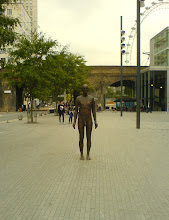I succumbed. Despite the reviews, the poor American box office, and even my own judgement, a moment of nostalgia for the literature of the Elizabethan period (and my erstwhile academic career) prompted me to catch Elizabeth: The Golden Age, the second of the Cate Blanchett-starring MTV-ersatz biopics directed by Shekhar Kapur. While the 1998 film dealt with the young Elizabeth I grappling with her new role as queen and the internal politics of a theologically-divided England, this latest project concentrates on her late middle age and international relations.
This time Kapur plays even more fast and loose with history, as William Nicholson and Michael Hirst's script seeks to draw a parallel between the contemporary western clash with Islamic fundamentalism and the 16th century Catholic anti-Reformation. However, its lack of seriousness is typified by the laughably creepy Philip II of Spain (complete with a ludicrous spindly walk stolen wholesale from John Cleese) as the film makes no real attempt to explore the complexities of the theological and ontological dialectics, other than position Catholic Spain as a sinister reactionary foe against which Elizabeth must test herself and secure English freedom. Mary Queen of Scots fares little better, being reduced to a duplicitous and rather snide cameo in which the wonderful Samantha Morton frankly steals the film. There are a few attempts to touch upon the uses of torture, internment and the business of national security in the Machiavellian dealings of Sir Francis Walsingham (played again by Geoffrey Rush), but they are brief, under-developed and instead work much better to portray how families of the period were brutally divided by these issues, forced into betrayals, exile or cowardly silence.
Perhaps what disappointed most was the reduction of Sir Walter Ralegh (Clive Owen, gamely channelling The Horse Whisperer) from a guileful, scholarly, politico-adventurer to west country bit of rough and inventor of the baked potato. In keeping, his considerable poetic skill is now no more than feeble chat-up material which Elizabeth (55 years-old at this point) cannot resist. It's a sad fate for the cunningly imaginative writer of the 'Ocean to Scinthia' and The Discoverie of the Large and Bewtifull Empire of Guiana, and a seriously misguided attempt to replicate the narrative of Elizabeth and Leicester's romance in the earlier film, doing major injustice not just to the historical figures but the actors as well. Ralegh's far more intriguing relationship with Bess Throckmorton (see instead the excellent biography of her by Anna Beer) that broke taboos of status, court and contemporary religious ethics is also now sidelined into the minor part of a ménage-a-trois. History necessarily tweaked, we have the further head-scratching occurrence of sea-dog Ralegh charging in, like Bruce Willis from the Die Hard series, to guide Sir Francis Drake when the Armada eventually appears (despite playing no part in the actual engagement). The CGI battle that provides the climax to the film is admittedly a stupendous spectacle, but at its heart is an absurd and wholly unexamined jingoism that leaves a very peculiar taste.
One was just left with the feeling that there were several great films here: unfortunately none of which actually got made.
Friday, 9 November 2007
the stage of fancies tragedye
Subscribe to:
Post Comments (Atom)



No comments:
Post a Comment